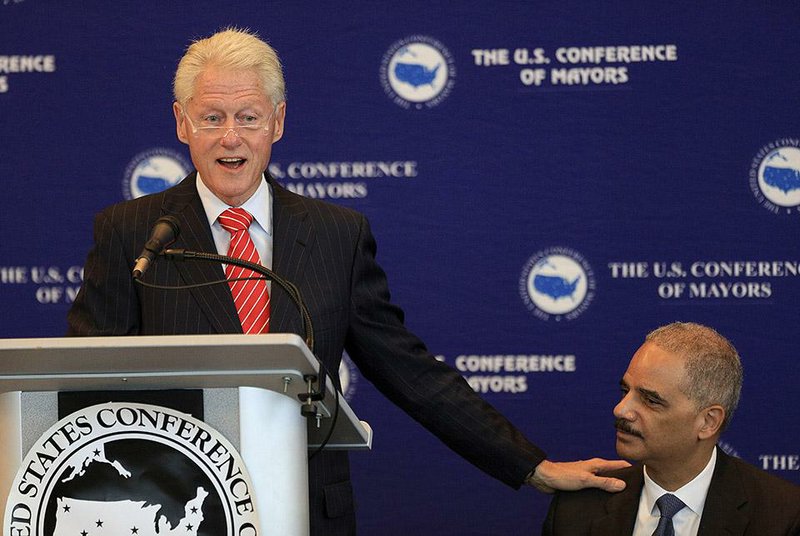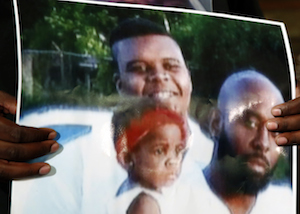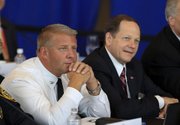Citizens must start getting to know their neighbors despite physical, political or religious differences if they want to prevent events like what happened in Ferguson, Mo., former President Bill Clinton told a gathering of the nation's mayors and police chiefs Wednesday in Little Rock.
The Community Oriented Policing Services Program, or COPS, which Clinton signed into legislation 20 years ago this month, is a model example of how that get-to-know-each-other philosophy works, he said. The program, which added 100,000 officers across the country at the time, aims for police to interact with and build trust among residents in the communities they patrol.
Clinton and U.S. Attorney General Eric Holder spoke Wednesday at the U.S. Conference of Mayors event at the Clinton Presidential Center about how local police departments and governments can better avoid such situations as that in Ferguson when an unarmed black teen was fatally shot in the street by a white officer, inciting riots and weeks of protests.
The Community Oriented Policing Services Program is one way to build on trust between residents and police, the two said to an audience that has as a goal to put together a policy document of best practices that will be delivered at the association's winter conference in January.
Holder lauded what he called a "dramatic reduction" in the nation's overall crime rate since the program began 20 years ago, but said too many communities aren't sharing in these gains.
"This is something we saw all too clearly this past August as the eyes of the nation turned to events in Ferguson, Mo. ... When I traveled to Ferguson days after the incident, my pledge to the people was our national Department of Justice would remain focused on the challenges they faced long after the national headlines have faded. [Here at the conference] we're making robust and sweeping action to make good on the pledge," Holder said. Holder announced his resignation last month but said he would remain attorney general until his successor was named by President Barack Obama and confirmed by the Senate.
Little Rock is no stranger to community protests against police activities. More than 250 mostly black residents gathered last year to protest near the scene of where a black police officer shot and killed a 26-year-old black man who police say was armed. Protesters chanted "F*** the police" and "No Justice, No Peace."
They also invoked the name of Bobby Joe Moore III, a black 15-year-old who was shot and killed in Little Rock in August 2012 by a white officer. The officer, Josh Hastings, said Moore was part of a group of burglars and that the teen tried to run him over while fleeing. Hastings was charged with manslaughter, but prosecutors dropped the charge earlier this year after two juries deadlocked.
A Chicago attorney representing a Little Rock police sergeant in a civil-rights lawsuit against the city's Police Department used Holder's presence in town Wednesday as an opportunity to request that the Department of Justice conduct a pattern and practice investigation into the Little Rock department.
In a 36-page letter to Holder, attorney Michael Laux of the Laux Law Group wrote that his request is "based on a well-documented custom of tolerance of unwarranted police shootings, excessive force and violent misconduct, all of which disproportionately affect Little Rock's African-American citizens."
He said that from 2001 to 2014, there were 107 Little Rock officers who participated in 80 police-involved shootings, including 26 repeat offenders. Of the 57 victims, 41 were black. The Police Department couldn't immediately verify those numbers Wednesday.
It's unclear if Holder received a copy of Laux's letter Wednesday, but he didn't address it during his speech. The conference remained focused on the success of the Community Oriented Policing Services Program.
The Little Rock Police Department has employed community-oriented police officers since 1992. The past few years saw a reduction in funding and resources for the program, which dwindled to just two officers desginated for the Community Oriented Policing Services Program last year. But the program went back to being fully staffed this spring with one sergeant and 13 officers stationed across the city's 11 neighborhood resource centers.
The U.S. COPS Office has awarded $14 billion over two decades that assisted in adding 126,000 officers, as well as with the training of 700,000 officers and community members. Holder recently announced an additional $124 million in funding to support the hiring or retaining of an additional 944 officers. A Community Oriented Policing Services Program grant pays 75 percent of an officer's salary and benefits for three years.
A federal audit in 2005 of 3 percent of the first decade of program grants drew criticism when it was said that hundreds of millions of dollars were misspent and that tens of thousands of jobs funded by the grants were never filled or not filled for long. Critics also said there was little evidence that the Community Oriented Policing Services Program was a big factor in reducing crime, a criticism Clinton addressed Wednesday.
Clinton said the program isn't just about adding police officers and it isn't that more officers automatically resulted in less crime -- it's what the officers are doing that is making a difference.
"The idea was to enable people like you to change the way you related to the community," he told the mayors and chiefs. "To have physical presence and trust and relationships. To create an environment to reduce the amount of crimes committed in the first place, as well as the ability to solve them with a minimum amount of resistance and maximum amount of cooperation. I don't think there's any question [the Community Oriented Policing Services Program] had a significant amount of impact to change the situation."
Two decades ago, violent crime had tripled since 1964, the population had increased and the size of the nation's police forces had grown by just 10 percent, Clinton said.
Little Rock Mayor Mark Stodola noted that the early '90s were a time of increased gang violence in middle America, particularly Little Rock.
"I had a hard time keeping witnesses alive, and then you had to learn the gang language," Stodola said, telling of his days as a prosecuting attorney. "So that's the context many of you remember when the [Community Oriented Policing Services Program] legislation was brought forward."
Recently hired Little Rock Police Chief Kenton Buckner began his career as a program officer in Louisville, Ky., when the program started. He said it's surreal to be celebrating its success 20 years later as a police chief.
"I think agencies are learning that just saying we are adding to our authorized strength is not enough. It's more important to see what you are doing with those officers -- how they are impacting the community, what are their duties and what kind of programs and services you provide," Buckner said.
Clinton talked about other areas that need to be addressed when it comes to trusting the police and justice systems and creating a better quality of life. He said education programs need to be increased in prison systems, noting a near zero percent recidivism rate among criminals who leave prison with some type of educational certificate or degree.
He also cautioned against the increase of police departments' use of military-style equipment and weapons, something he said started under his presidency unbeknownst to him.
"Sometimes the picture says more than the donation dollar amount about the real net impact of what some of these transfers have on your need to feel connected to your community," Clinton said.
He also said he was stunned to hear white residents in Ferguson say they had no idea a racial situation existed.
"We cannot afford to not know our neighbors. It doesn't matter if they don't vote the way we do. It doesn't matter if they don't worship the way we do or don't look the way we do. We cannot afford to not listen to and know our neighbors. ... Everywhere in the world from the poorest to the healthiest and in between, where people are working together, good things happen. Where people are blind to the fear, hopes and dreams of neighbors, good things do not happen. This is not rocket science."
A section on 10/09/2014





